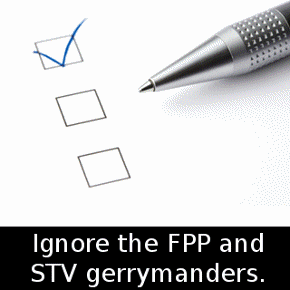The overhang may decide the election
Post has been updatedIsn't it interesting that it looks like that a party that most of us cannot vote in any of its candidates** could well decide who the Government is - and that party - the Maori Party - could be part of a Government led by a party - Labour - that is rejected by nearly two thirds of the electorate, with fewer votes than the entire Opposition bloc.
That's the overhang for you.
Based on the latest
Roy Morgan Poll, showing National can govern alone, if there is a two percent swing to Labour, and if the Maori Party choose Labour, not only do the
overhang seats hold the balance of power, the Government will have less votes than the Opposition. Labour will be in Government even though all four parties on the left ( Labour, Greens, Progressives, Maori) have fewer votes than National on its own.
But don't blame the Maori Party. Don't blame the Maori seats. Don`t blame the Treaty of Waitangi - the Maori seats have nothing to do with the Treaty. Don't blame the Maori electoral option, don't even blame MMP. It`ll be the fault of the increasing number of those on the Maori roll for splitting their votes - which in a democracy, they have every right to do.
The
Roy Morgan poll came out on Friday giving National 62 seats (49.5%) with Labour 44 seats. Assuming the leaders of Act, Progressives and UnitedFuture retain their seats and the Maori Party get the Maori seats:
National 62 (49.5%)
Labour 44 (35%)
Greens 9 (7%)
Maori Party 7 (2%,4 overhang seats)
Act 1 (1 seat)
Progressives and United Future (0.5% and 1 seat each)
Although National could govern alone, a National/Maori coalition has 69 seats - a 13 seat majority. But if there is a 2% swing to Labour and the Maori Party decides to go with Labour, this could be the horrific result: as
Nicholas kind of alluded to.
National 59 (47.5%)
Labour 46 (37%)
Greens 9 (7%)
Maori Party 7 (2%, 4 overhang seats)
Act 1 (1 seat)
Progressives and United Future (0.5% and 1 seat each)
National, Act and United Future get 61 seats (49.5%). Labour , Greens and the Progressives have 54 seats but along with the Maori Party get 63 seats ( 46.5% ). Labour get into Government even though the Labour coalition - not just the Labour Party - has fewer votes than National.
This is more drastic than
Keith Ng's exampleImagine this scenario:
Anderton, Dunne and Hide gets <2% party vote between them. Maori Party gets all 7 Maori seats, with 3% of the party vote. We get a Parliament of 125 MPs. National + Hide + Dunne have 62 seats. Labour + Greens + Anderton have 56 seats.
That's what happens when you get a party in Parliament that a huge swag of people will vote for their candidates - but won't vote for the party.Any party who had greater electoral support out of proportion to its popular support will get an overhang. The Progressives would have if polling translated to votes - Matt Robson would never have got his list seat if there were 0.08% fewer votes, United Future came close. Others get more party votes than the parties that get electoral seats, but miss out because they dont get an elected representative.In 1999, NZ First got less votes than the Christian Coalition did in 1996, but Winston Peters sneaked in by 63 votes - and NZ First got five seats.
Unlike Keith, I do not think overhangs are a distortion created by the Maori seats, however such overhangs can be encouraged by political parties that a certain proportion of the population can "opt-in" to vote for their candidates.But what I do know is that whoever wins the fight for the Maori seats will be in Government. National won the fight in 1996 when NZ First, as kingmaker, selected it and National could win the fight again in 2008 if the Maori Party, as kingmaker, selects National. But, basedon this poll, so could Labour with a favourable swing inside the margin of error.
That's because the overhang will decide the Government and the overhang
will be the Maori seats. The overhang is an hangover of MMP -so that means we won`t have a hung parliament - we'll have a drunk parliament.
Since 1996, of the two main parties, whoever has been onside with the holder of the Maori seats has formed a government. So, National won't abolish the Maori seats any time soon.
**
The Maori party stood 35 candidates in General seats at the 2005 Election. So you can vote for Maori candidates in many General seats but all votes are likely to be wasted.Labels: MMP;Maori Party











